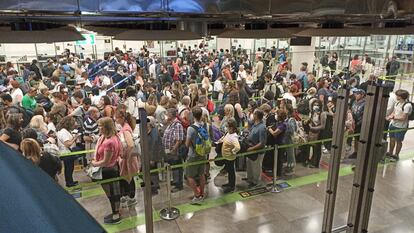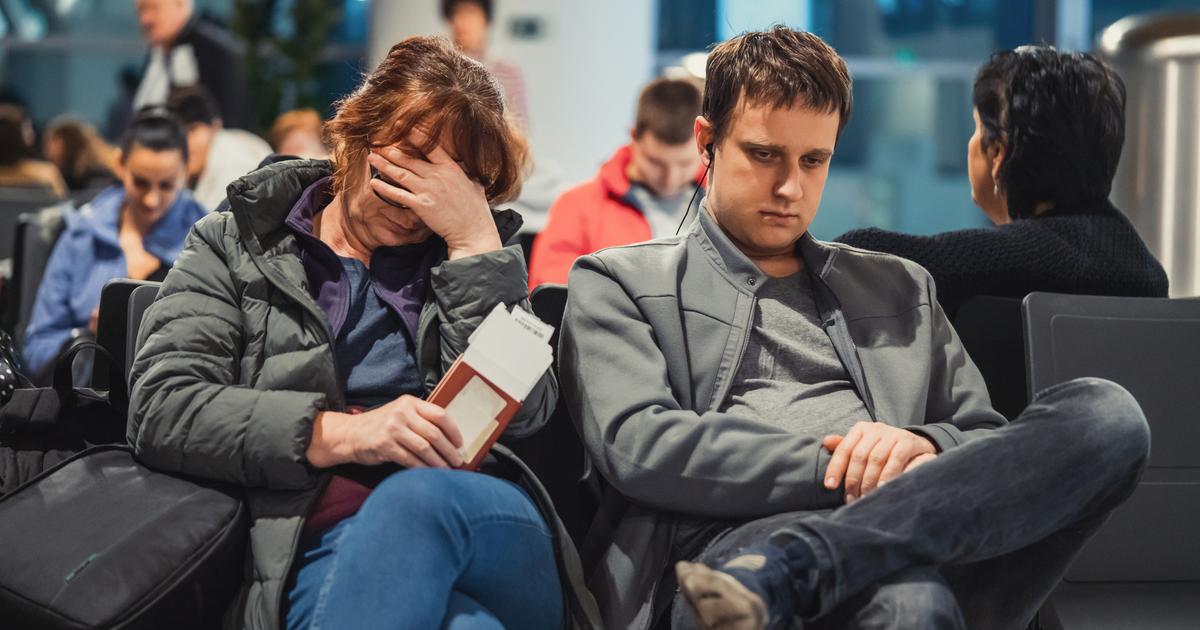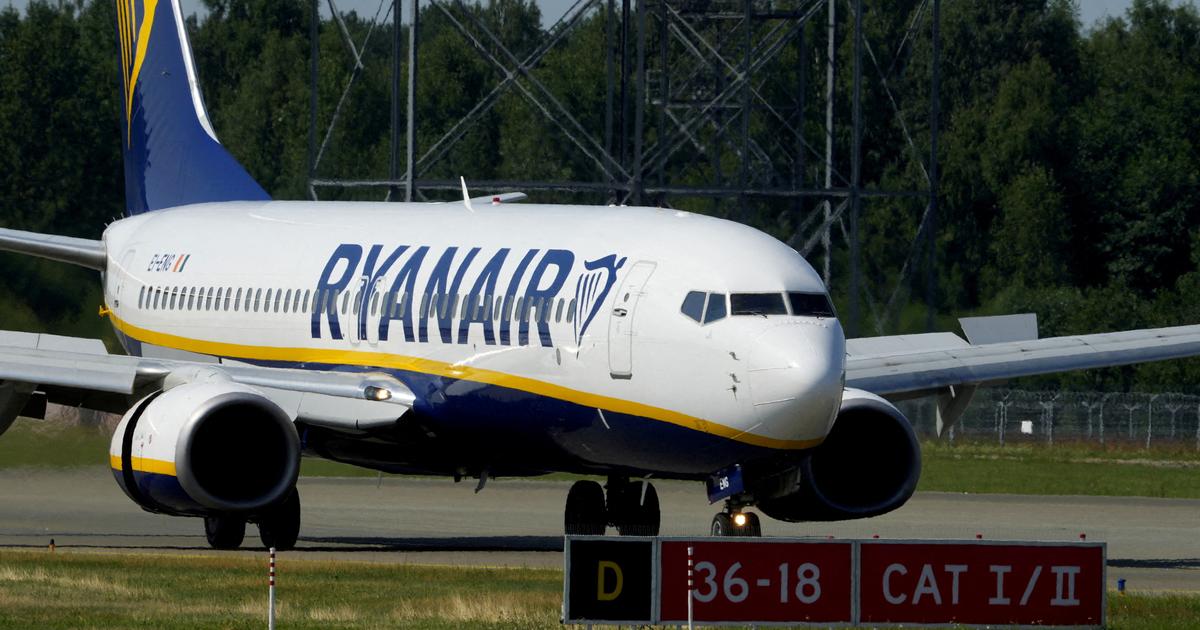Queues have always formed at airports during the summer, but in this 2022, a flood of vacation-hungry travelers after two years of the pandemic has run into an obvious shortage of staff, both on the ground and in the flight, and the result is being an airport chaos that affects all of Europe.
Brussels airport accumulates delays in 72% of its flights so far in July, according to a report by the
online travel agency
Hoppers;
7.8% of the planes that were scheduled to leave the Frankfurt airport have been cancelled.
Four Spanish aerodromes are among the best, according to Hopper, and, even so, their percentages —especially delays— are significant: Gran Canaria (8% delays and 0.3% cancellations);
the Adolfo Suárez Madrid-Barajas airport (19% delays and 0.4% cancellations);
Malaga (24% delays and 3.3% cancellations);
and Alicante (20% delays and 3.4% cancellations).
In these lines we offer a series of tips to navigate this perfect storm.
And a reminder: as passengers we cannot do anything if the flight is delayed or cancelled, but the drink will be less bitter if one is well informed, knows their rights and has a plan B.
More information
Which countries require travel insurance for tourists?
Get informed and make sure
“We have suffered a higher incidence of delays, cancellations and loss of baggage”, certifies Manuel López, CEO of InterMundial.
Against that he only knows two recipes: ensure the trip well and be better informed than ever.
Regarding the first, if anyone came out of the pandemic with any doubts about the advisability of cancellation insurance, this summer is being the definitive test of how necessary it is.
“An insurance company has to make the stay at the airport as pleasant as possible;
make up for lost services, such as a hotel or tour;
and pay extras such as a flight change supplement ”, he lists.
López recommends anticipating events.
"In the event of a strike announcement, you have to check if our flight is subject to minimum services or not," he explains, insisting that airlines have an obligation to reschedule and offer alternatives.
InterMundial keeps its policyholders up to date on their flights, through its application.
Iberia or Vueling offer a similar service, and encourage their travelers to use it.
"It is highly recommended to insert your contact information in the reservation so that we can inform you, in real time, of any news or incident related to your flight," suggests the first airline.
"Check your flight information through the airport screens: it is very important that you are aware of it in order to anticipate any change or modification of the flight", insists the firm
low cost
.
Queues at passport control at Barajas airport, on June 7. IBERIA (IBERIA)
The more queues, the more advance
The only official advice from Aena is to respect the time in advance with which you have to arrive at the airport according to what each airline indicates on the ticket.
"At Vueling we recommend being there at least two hours before the departure of your flight," says the airline.
"If a suitcase is checked, for short and medium-haul flights, the recommendation is two and a half hours, and four for long-haul flights," Iberia details.
Aena reminds that passengers from countries outside the European Union or the Schengen area must present an EU digital covid certificate (or equivalent) or a negative PCR.
And that there are destinations that demand the same requirements for Spaniards who travel to them.
Regarding the use of masks in airports and airplanes, since last May 16 the European Union has relaxed, as a general rule, its use.
But with exceptions: the plane, as a means of transport that it is, is subject to what each country decides.
In those in which the mask is mandatory in transport, as is the case in Spain, it must be worn on the plane.
In the United States, for example, it is not mandatory.
There are companies that have decided to stop requiring the face mask if it is not mandatory at the destination either.
So you have to take into account the airport of origin, the destination and the company with which you fly (again, the importance of informing yourself beforehand becomes clear).
Choose the company, the day and the time of the flight well
"During high traffic peaks at airports, we avoid low-cost airlines," says Vanessa Santiago, responsible, together with Roger Carles, for the blog
Viajeros Callejeros
.
In his extensive experience, the cheapest airlines delay and cancel flights at a higher rate than those that are not.
And, in addition, they do not have agreements with others to relocate their passengers.
The particular statistic of this traveling couple indicates that many more short flights are canceled than long ones.
And that routes with stopovers multiply the chances of suffering an incident.
"If you have to make a stopover, try not to go too short on time, since a delay in the first plane can make you miss the second," they warn.
Another of his clues: it is more difficult to stay on the ground flying in the first plane in the morning than in the last one at night.
"Delays and problems accumulate in a kind of chain reaction," they describe.
Vanessa and Roger flee from marked dates, such as bridges, holidays or fortnight changes.
"The agglomeration is even greater, and if there is a strike they will put it on you on those days," she warns.
In addition, whenever they can, they fly outside of peak hours, where the possibility of problems increases.
A look at the Infovuelos section of the Aena website confirms what logic already intuits: Friday and Sunday afternoons are the busiest.
“Give me 261″
Many times, passengers go to the counter of their airline, after a flight has been delayed or canceled, without knowing their rights.
The airline is obliged to give you, right there, a copy of 261 (Regulation No. 261/2004, of the European Parliament and of the Council on passenger rights), if requested.
And to meet their demands, of course.
If it is a delay, "he has to bear the costs of food, drink and accommodation," says Manuel López, from InterMundial.
If it is a cancellation, "the user has the right to be given a bonus to fly later, or to have the money returned," he specifies.
And, in any case, you will receive compensation, which will depend on the hours of the sit-in and the kilometers that the traveler was to travel.
López recommends documenting everything very well,
have a plan b
"It's not about obsessing over the fact that there will be problems, but we have to consider them as a possibility," explains Vanessa Santiago, who sees fit to have a plan B, in case the plane fails.
Perhaps the chosen destination can be reached by ferry, or by train, much less likely to suffer delays or cancellations.
Or perhaps the best thing is to choose a completely different destination, by car, with the compensation money.
Subscribe here to the
El Viajero newsletter
and find inspiration for your next trips on our
,
and
Instagram accounts
.









